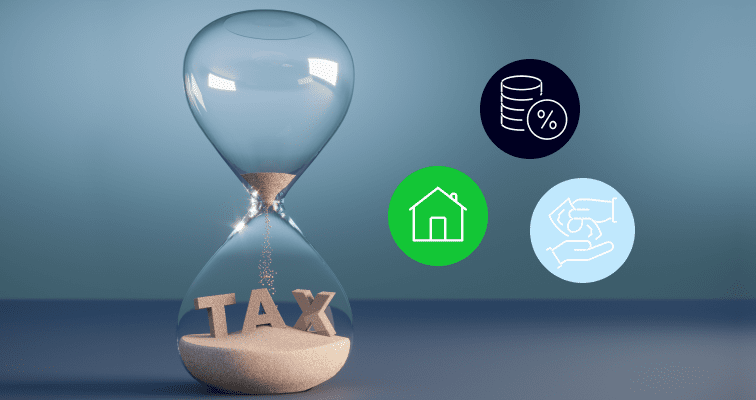In most countries, every time you sell assets such as shares, there is the possibility that you will need to pay capital gains tax (CGT) on any profits you make. However, the Swiss authorities take a distinctive approach to taxation. Find out what CGT is, how it works in Switzerland, and what you should know as an investor.
Thanks to accommodating legal processes and taxation structures, Switzerland has a well-established reputation for being investor-friendly. However, it’s not just high-net-worth investors who find that moving to Switzerland can be beneficial in terms of investment returns, as on the whole, taxation rates are generally favourable compared to other countries. However, this does not mean that investors in Switzerland have no taxation liabilities whatsoever.
Developing a better understanding of what happens when you liquidate assets can not only reassure you that you are being compliant, but might also present opportunities to reduce your overall tax burden. This guide will help you to navigate the post-trade taxation environment in Switzerland.
What is capital gains tax (CGT)?

Capital gains tax is a levy incurred on returns from the sale of various capital assets. In most countries, whenever you sell assets, there is the possibility that you will need to pay CGT on the profits you make. The distinctive approach to taxation taken by the Swiss authorities, however, means that this is not always the case in Switzerland.
In Switzerland, most capital assets do not fall within the scope of CGT. However, while headline CGT rates in Switzerland are zero, there are other taxes to consider. Wealth taxes may be applied at a regional level with the rates varying across cantons and according to personal circumstances.
Tip: The Swiss wealth tax applies on a sliding scale: the higher your net wealth, the higher the wealth tax rate.
Despite most assets in Switzerland being CGT-exempt, investors need to report their assets, and declare details of any transactions and holdings in their tax returns (even if they are CGT-exempt).
To understand capital gains tax in Switzerland, it is important to consider both local level and national tax regimes. The 26 cantons of Switzerland (cantons can be likened to “republics”) are member states of the Swiss Confederation. Taxes are applied on both a national and canton-specific basis.
Regional differences and the role of cantons are recurring themes when considering how tax works in Switzerland.
This concept is not as confusing as it might seem. Investors do not have to file two reports. Instead, filings and tax payments simply need to be directed to the tax authority of the canton you lived in at the end of the tax year. The canton authority will then be responsible for sending the amount owed directly to the Federal Tax Administration (FTA).
Tax payments in Switzerland are based on the tax filing you submit to the canton, and are usually processed throughout the year in a series of instalments. Despite this, there are tax reporting tasks that you will have to complete yourself to avoid penalties. The Swiss tax year runs from January 1 to December 31, and most citizens need to submit their returns by March 31 of the following year (this deadline will differ in some cantons).
Tip: It is your responsibility to ensure accurate and updated self-reporting. Failure to be compliant can result in penalties.
What assets have capital gains tax (CGT)?

Calculating your capital gains tax liabilities starts with an analysis of your investments and establishing which ones fall into the scope of CGT.
Most capital assets do not fall within the scope of CGT in Switzerland, and the tax rate applied on those that do — vary according to numerous factors, including the asset type, how long you have held a position (longer-term investments are generally taxed at a more favourable rate), and whether you are considered to be a private investor or a professional securities dealer.
Most retail investors will be categorised as private investors, which is associated with more favourable tax terms, but it is something you need to check.
Private investors in Switzerland usually avoid paying CGT on most of their assets, but should pay CGT on returns made from selling non-movable assets, such as real estate.
Aside from property, in Switzerland, most capital assets are not subject to CGT. While not an exhaustive list, some popular CGT-exempt assets include:
- Private pensions
- Your main residence and holiday home — if certain conditions are met
- Shares, units and similar investments
- Corporate bonds
- Mutual funds
- Income on foreign real estate
- Personal possessions
- Interest on savings
- Dividends
- Cryptoassets
- Currency trades
How does CGT impact my other investments?
In Switzerland, investors will typically keep 100% of the profits made on trades made in the stock market. This is different from many other countries, where investors typically lose a significant portion of their gains in the form of CGT.
The absence of CGT on popular instruments such as stocks and bonds may influence your thinking and investment decisions, and may encourage you to allocate more of your capital to certain types of assets.
Conversely, CGT in Switzerland relates mainly to real estate investments. The way that the tax is applied might make you consider holding assets for longer, at least five years, so that when the time comes to sell them, the applied tax rate is more favourable.
Regardless of the strategy you choose to adopt, one of the main impacts of taxation on your investment routines will be the need to keep effective records of all transactions.
Information worth keeping includes:
- Details of share dealing transactions
- Details of transaction fees and commissions
- Property transaction details
- Accounting and legal costs
- Valuations, especially of illiquid assets
Married couples are required to submit a joint tax return and their assets are assessed together.
How do I calculate my CGT?
You won’t pay CGT on assets such as cryptocurrencies and stocks, but income from trades in those instruments might be treated as income, and taxed accordingly, or holdings might come into the scope of Swiss wealth tax.
Don’t forget that you have to report your assets in your tax return, even if they are exempt from CGT. Despite there being little CGT applied in Switzerland, the existence of a wealth tax, and canton and federal tax codes, add complexity to tax reporting in Switzerland, and investors may still benefit from getting advice from a professional tax advisor. Professional guidance can help to ensure that you comply with all of the requirements and could possibly identify ways to enhance your overall returns.
When calculating your CGT liabilities in Switzerland, you may benefit from using the free FTA Tax Calculator. It will incorporate information relating to both federal and local taxes.
Tip: The cantonal tax authorities are an ideal source of information, and provide services in German, French and Italian.
The taxable capital gain on a property is the difference between the selling price and the amount of money invested in the property. The “money invested” element relates to costs incurred over the time you owned the property, and the exact T&Cs of what fees apply — vary from canton to canton.
Establishing a rough idea of what might be factored in can be achieved by considering the items that count as money invested in the canton of Geneva:
- The original purchase price of the property
- Expenses for building work, including conversion work, land improvements and other value-enhancing renovations of the property (if the building works are financed by municipal grants or insurance payouts, then this amount needs to be deducted from the total building work total).
- Costs relating to connecting the property to the highway system and utility services
- Real estate agent commissions on both the purchase and sale of the property
- Advertising costs when buying and selling
- Legal and administrative fees relating to transfer of ownership
- Any early repayment charges paid
How can I minimise my CGT burden?

While you may not be able to avoid paying capital gains tax entirely, there are strategies you can use to minimise your tax burden.
Own your property for longer
The CGT rate on real estate assets varies from canton to canton, but one broad trend that is noticeable is that properties held for longer are liable for a lower percentage point rate of CGT.
Properties held for less than two years typically have the highest CGT rate applied to them. Once you have held a property asset for five or more years, you can expect the CGT rate to taper down. The longer you hold it, the less tax you pay. Some cantons do then cap the tax break at a certain number of years.
For instance, in the canton of Zurich, maximum relief is reached after 20 years of ownership, but in the canton of Berne, it is after 35 years.
Speak to a professional
When it comes to tax, engaging the services of an experienced professional can help you to establish ways of minimising the tax you pay. Expert advice can also help you to be more confident that your returns are fully compliant.
Final thoughts
The fact that so many investments in Switzerland are exempt from capital gains tax at first sounds like an offer that is too good to be true. To some extent it is, but you still need to keep accurate records of your investment transactions and submit an annual return to the tax agency of the canton in which you live.
Other taxes, in particular, wealth tax, also come into play, but the absence of CGT on so many asset groups does at least make trading in them more straightforward. This leaves you with time to focus on the core task of picking the best investments to help you to reach financial independence.
Join eToro today and learn more about CGT, investing in shares and trading in general.
eToro does not provide tax advice and the information provided should not be interpreted as such. Customers should seek independent tax advice.
FAQs
- What is the best way to keep records of my investment activity?
-
Despite the widespread absence of CGT in Switzerland, it is still recommended that you keep accurate and up-to-date records of your trading activities — and this is where your broker can help. Most brokers will provide downloadable statements that cover an entire tax year, but some offer additional services such as reports specifically designed to help you to navigate the tax reporting process.
- Is there a “wealth tax” in Switzerland?
-
Yes, there are wealth taxes that are levied by the canton of which you are a resident. It applies to all of your assets, including foreign investments. Items that might be factored in to reduce your net wealth calculation include debts.
- Which Swiss canton has the lowest wealth tax rate?
-
Wealth tax rates are set at a canton level, and while open to change, some cantons have established a reputation for applying relatively low rates. Residents of the canton of Zug pay a wealth tax rate of 0.05% on the first CHF168,000, and 0.10% on the next CHF168,000. The next tranche is taxed at 0.10%, and anything above CHF504,000 is taxed at 0.20%.
This information is for educational purposes only and should not be taken as investment advice, personal recommendation, or an offer of, or solicitation to, buy or sell any financial instruments.
This material has been prepared without regard to any particular investment objectives or financial situation and has not been prepared in accordance with the legal and regulatory requirements to promote independent research. Not all of the financial instruments and services referred to are offered by eToro and any references to past performance of a financial instrument, index, or a packaged investment product are not, and should not be taken as, a reliable indicator of future results.
eToro makes no representation and assumes no liability as to the accuracy or completeness of the content of this guide. Make sure you understand the risks involved in trading before committing any capital. Never risk more than you are prepared to lose.


